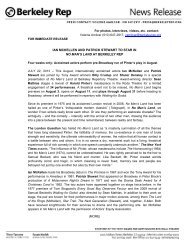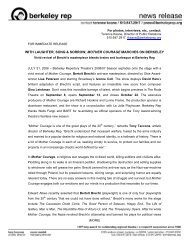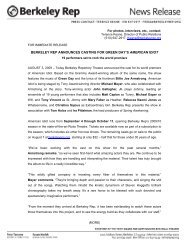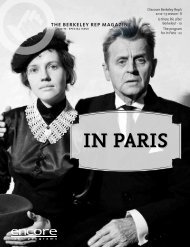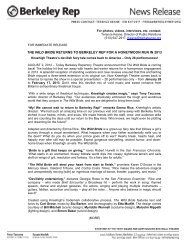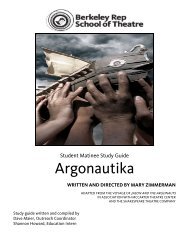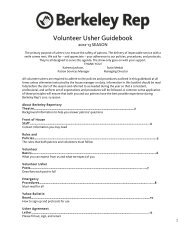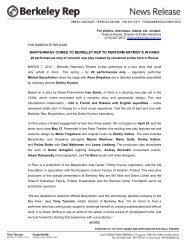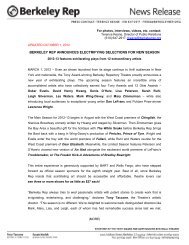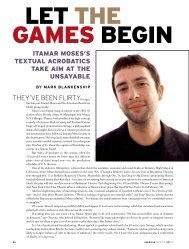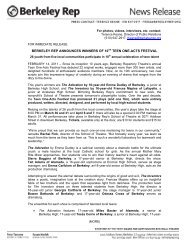the berkeley rep magazine - Berkeley Repertory Theatre
the berkeley rep magazine - Berkeley Repertory Theatre
the berkeley rep magazine - Berkeley Repertory Theatre
You also want an ePaper? Increase the reach of your titles
YUMPU automatically turns print PDFs into web optimized ePapers that Google loves.
just like <strong>the</strong> original homeric epic, Lisa Peterson and Denis O’Hare’s adaptation of The<br />
Iliad has traveled up and down <strong>the</strong> country over <strong>the</strong> past few years. The production at <strong>Berkeley</strong> Rep<br />
starring Henry Woronicz is a co-production with La Jolla Playhouse. There have been many previous<br />
incarnations, from <strong>the</strong> Pacific Northwest to Princeton to Chicago, and now, <strong>the</strong> West Coast.<br />
Though some of <strong>the</strong> details might alter from production to production, and though <strong>the</strong> face of <strong>the</strong><br />
actor playing The Poet may change, <strong>the</strong> heart of <strong>the</strong> play and <strong>the</strong> powerful sense of human connection<br />
it inspires remains <strong>the</strong> same.<br />
Director Lisa Peterson, who won an Obie Award for <strong>the</strong> co-adaptation An Iliad you’re about<br />
to see, kindly took a few moments to share her thoughts about <strong>the</strong> project’s journey from Homeric<br />
Greece to 21st-century <strong>Berkeley</strong> with Madeleine Oldham, <strong>Berkeley</strong> Rep’s resident dramaturg.<br />
Can you tell us a little bit about where <strong>the</strong> idea came from<br />
and how <strong>the</strong> project got started?<br />
It was 2003 and we had just invaded Iraq—I started<br />
thinking about war plays, and remembered a friend telling me<br />
that she teaches The Iliad as <strong>the</strong> first play in her world drama<br />
course. That had always stuck with me, because I love The Iliad,<br />
but had studied it as a poem, not a play. But I began to read<br />
about Homer and <strong>the</strong> Singers of Homeric verse, and started<br />
to see that in fact <strong>the</strong>se were spoken-word events. This is<br />
before <strong>the</strong> invention of drama by <strong>the</strong> Greeks in 400 BC; this is<br />
hundreds of years before that, when <strong>the</strong>se singers would travel<br />
from place to place, telling <strong>the</strong> story of <strong>the</strong> Trojan War using<br />
a structure that was partly memorized and partly improvised<br />
nightly. I called up my friend Denis O’Hare, who is an amazing<br />
actor and a very political and articulate person, and asked if<br />
he’d be interested in exploring some kind of re-creation of that<br />
ancient practice.<br />
you and Denis O’hare created <strong>the</strong> text toge<strong>the</strong>r. how did<br />
that process work?<br />
We really had to just feel our way along, since nei<strong>the</strong>r<br />
of us considers ourselves a traditional playwright. We’d get<br />
toge<strong>the</strong>r whenever we were both in New York, and we’d read<br />
one book of Robert Fagles’ glorious translation, and <strong>the</strong>n we’d<br />
talk about it and tell it to each o<strong>the</strong>r in our own words. One<br />
day, Denis brought his video camera, and we started recording<br />
our conversations, and that was a real turning point. Over<br />
a few years of short development retreats, some wonderful<br />
interns at New York <strong>Theatre</strong> Workshop and at Sundance Theater<br />
Lab transcribed our conversations. Those transcriptions,<br />
combined with <strong>the</strong> Fagles verse, formed <strong>the</strong> backbone of An<br />
Iliad. At Sundance, we also began to actually write—creating<br />
<strong>the</strong> character of The Poet, creating <strong>the</strong> arc of <strong>the</strong> evening, and<br />
putting many of <strong>the</strong> encounters between <strong>the</strong> story characters<br />
in a contemporary vernacular.<br />
stories don’t get much more epic than The Iliad. how did<br />
you reach <strong>the</strong> decision to convey such a gigantic world with<br />
only one actor?<br />
It was our interest in finding a contemporary way to<br />
recreate what we imagine would have been <strong>the</strong> experience<br />
of hearing The Iliad back in 1200 BC. It was <strong>the</strong> original solo<br />
performance. We became as interested in <strong>the</strong> experience<br />
of telling <strong>the</strong> story as <strong>the</strong> story itself: what does that cost<br />
emotionally? How is it possible? Why does <strong>the</strong> human race<br />
need <strong>the</strong>se stories, some of which are still resonant 3,200<br />
years later?<br />
What surprised you in rehearsal? What did you find challenging<br />
about mounting this production?<br />
The biggest challenge, I suppose, is helping <strong>the</strong> actor build<br />
<strong>the</strong> stamina, and <strong>the</strong> memory, to tell this epic by himself. It<br />
isn’t easy, and it’s always amazing for me to watch one guy,<br />
like an athlete, train himself to be able to hold <strong>the</strong> stage and<br />
tell this giant story in a taut 100 minutes. The biggest pleasant<br />
surprise was our decision to add a live musician — a string bass<br />
player — when <strong>the</strong> production got to Princeton. Mark Bennett,<br />
<strong>the</strong> composer, and Brian Ellingsen, <strong>the</strong> player, have been with<br />
this production ever since. And it lends it a depth and aliveness<br />
that is always astounding to me. Plus, it makes <strong>the</strong> actor just a<br />
little bit less lonely.<br />
as you move on to direct o<strong>the</strong>r shows, and <strong>the</strong> memory of<br />
your time working on An Iliad fades, what about this process<br />
or production do you think will stay with you?<br />
For me personally, working on An Iliad was a great reminder<br />
that it is possible to build something from a tiny seed of an<br />
idea—when you don’t even know how to talk about it clearly—<br />
to an actual event that people respond strongly to. I have all<br />
kinds of o<strong>the</strong>r idea seeds that have been hanging out in <strong>the</strong> bottom<br />
of my pockets, and now I’m encouraged to get moving and<br />
make those happen, too. The o<strong>the</strong>r thing I’ll take away with me<br />
is a sense of awe that a piece of storytelling which has existed<br />
for thousands of years can still move people today. That’s deep.<br />
2012–13 · ISSUE 2 · <strong>the</strong> <strong>berkeley</strong> <strong>rep</strong> <strong>magazine</strong> · 23



